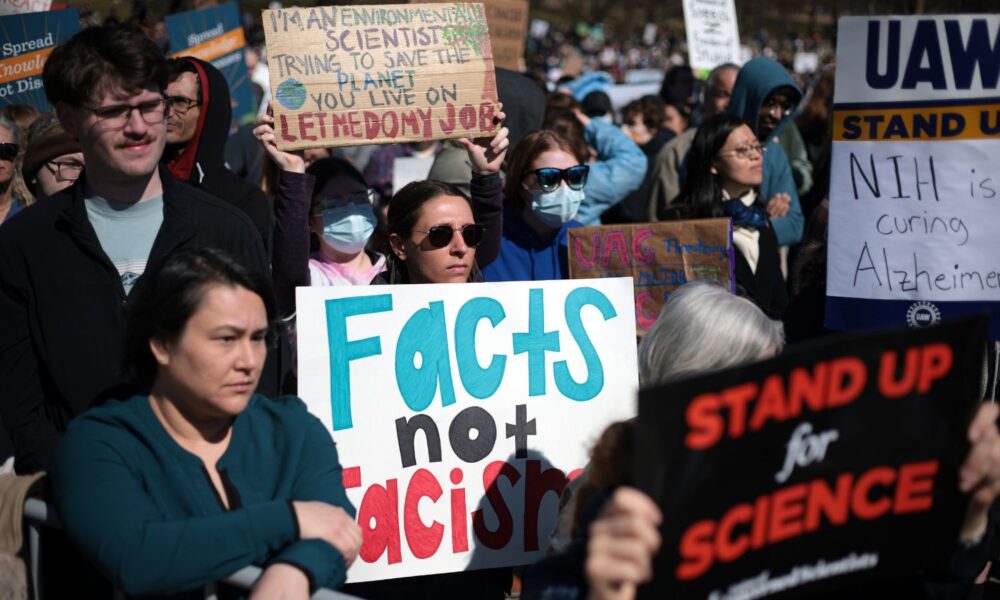This post was co-authored by Dr. Jonathan Riehl.
Since January 20, 2025, research and education have been in the cross hairs of the new administration. Research and education funding has been frozen or terminated. Words and stories have been effectively banned from use in funded and proposed research as well as wiped from government websites. Critical public data collection and resources have been halted and removed. Innocent students have had their visas revoked and in some cases have been abducted by our government. The attacks have been overwhelming and far reaching.
In the last couple of weeks alone, the US National Science Foundation has begun terminating awarded grants that study mis- and disinformation, and those aimed at broadening participation in underrepresented groups, such as women and minorities. Harvard University has had $2.2 billion in federal funding frozen after it publicly rebuked the administration’s likely unlawful demands received in a letter on April 11th. A federal program that screens coal miners for black lung disease has been shut down and $14 billion in climate grants are still in limbo as legal battles continue. Meanwhile leaked budget documents indicate that climate and space science funding at NASA and NOAA will be severely reduced, including cloud and hurricane modeling.
In a recent interview on WXXI NPR News Radio, New York Assemblymember Jen Lunsford made a poignant point about the recent attacks on research and education funding regarding the targeting of specific topics or words:
“It is an arbitrary and crazy way to make decisions about the effectiveness of programs. The word climate, this is a great example. We have a program in NY that provides funding for farmers to do work around soil health. It’s an incredibly popular, very effective program. But it’s called the Soil Health and Climate Resiliency Program, so it got halted because of the word “climate”. Whereas if it was called the Screaming Eagle Star Spangled Banner Soil Program, it would be fine. And this is where we are right now. And I will tell you my level of frustration is high.”
Exactly. Frustration among scientists is high. And the chaotic environment makes it difficult to focus on how to respond. So how do we identify where to focus our efforts? Unfortunately, there is no singular answer to this question. But silence in this moment is not an option. We scientists must focus on what is possible within the spaces that we inhabit and remember the power in community. For example, five thousand people stood up for Science in Washington, D.C., on March 7, with thousands more joining rallies in more than 20 other cities across the country.
We must preserve our values
Extensive evidence shows us that the principles of diversity, equity, inclusion, and accessibility (DEIA) make us safer, stronger, and more prosperous. They are essential for illuminating translational obstacles, for bringing in novel ideas, and generating more impactful education and research outcomes, and higher quality science. Our health and well-being are tied to the synergistic relationship between diversity and innovation. Loss of that synergy will impact everyone. As Dr. Martin Luther King Jr. wrote, “[W]e are caught in an inescapable network of mutuality, tied in a single garment of destiny. Whatever affects one directly, affects all indirectly.”
We must put into words why DEIA in science matters and how it must be a part of the way we approach science and education. We need to make it clear that we will not acquiesce to the impractical and unethical censorship of science and education; that we will uphold basic ethics and principles of diversity, equity, inclusion, and accessibility in the way we conduct ourselves as professionals and in our daily lives. To that end, we have crafted a pledge for all scientists.
Take our pledge
The Pledge for Progress is a commitment to uphold core social and environmental principles, and to strengthen them against politically motivated attacks that aim to impede or reverse progress in areas critical to our communities and our planet. The pledge specifically affirms our shared responsibility to advance diversity, equity, inclusion, accessibility, environmental justice, civic engagement, climate action, and ethical leadership. It also provides guidance for how to adhere to these principles even in the face of attacks.
We designed this as a broad, adaptable pledge for professionals across STEAM and related fields, and we actively encourage the creation of sector or discipline-specific versions. Whether you work in science, engineering, planning, education, healthcare, public service, or beyond, the pledge offers a foundation for ethical practice in an increasingly erratic policy landscape.
Versions can be tailored to different sectors including academic, corporate, government, or nonprofit, empowering individuals and organizations alike to resist unethical directives, shape internal policy, and center inclusive, sustainable values in their work. Practitioners can use the pledge to push back against harmful rollbacks and to affirm that the pursuit of justice, truth, and community well-being is non-negotiable.
We hope this grows into a broader movement where people can share tools, reflect on successes and failures, and engage in honest, supportive dialogue about what it means to live these values in practice.
Now is the time to act. Sign the pledge. Share it widely. Let’s build a united front to defend science, education, and justice for all. We are stronger together.
Views expressed in this blog belong solely to the authors as individuals.

